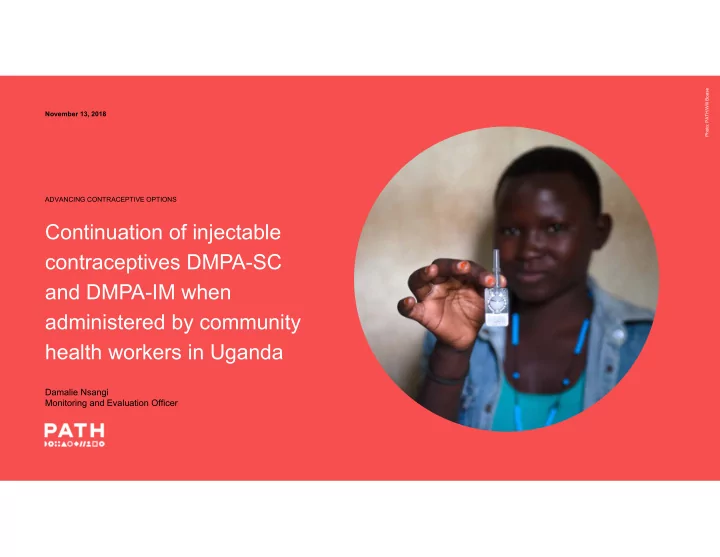

Photo: PATH/Will Boase November 13, 2018 ADVANCING CONTRACEPTIVE OPTIONS Continuation of injectable contraceptives DMPA-SC and DMPA-IM when administered by community health workers in Uganda Damalie Nsangi Monitoring and Evaluation Officer
Continuation of injectable contraceptives DMPA-SC and DMPA-IM when administered by community health workers in Uganda Task sharing and injectable contraceptives in Uganda • Offering contraception through a wide range of service-delivery points enables access and availability. • Proven High Impact Practice (HIP): Equipping community health workers to provide a wide range of family planning (FP) methods. • Community-based health volunteers (Village Health Teams, VHTs) were authorized to provide FP products, including the injectable products DMPA-IM* and DMPA-SC in 2013/2014. • We assessed women’s experiences and continuation with both products, which were administered by VHTs over 12 months. 2 *DMPA: depot medroxyprogesterone acetate
Continuation of injectable contraceptives DMPA-SC and DMPA-IM when administered by community health workers in Uganda Results • No difference was found in 12-month 1.00 continuation between the two methods. Both rates were relatively high at 77%. Probability of Continuation (%) • A similar study in Burkina Faso found much lower continuation rates (47-50%) when both products were administered via facility-based providers. 0.75 • Primary reasons for discontinuation were also similar between the two methods: • Being late for an injection. • Receiving the injection from a non-VHT. 0.50 • Side effects. 0 100 200 300 400 • Women aged 18 to 24 years were much less Time in Number of Days likely to continue the injectable as compared Aged 25-49 Aged 18-24 to women aged 25 to 49 years. Log-rank test of equality across strata, P=0.04 3
Continuation of injectable contraceptives DMPA-SC and DMPA-IM when administered by community health workers in Uganda Implications: • The high injectable-continuation rates suggest that provision of FP services through the community-based channel can be an effective distribution method for injectable contraception. • To reduce discontinuation of injectables, health workers must counsel women on side effects and reinjection timing. • Offering a wide range of contraceptive options and adequate counseling at multiple service-delivery points can enable women to switch to a new option when a particular method or provider no longer meets their needs. • Sub-groups, such as younger women, may need additional support to continue using contraception. 4 4
For more Contact Damalie Nsangi: dnsangi@path.org information: Visit: www.path.org/dmpa-sc 5 Advancing Contraceptive Options
Recommend
More recommend